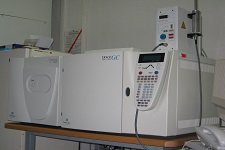Configurations and Separation Techniques
Mass spectrometry configurations and techniques are regarded to Mass Spectrometry configuration of source, analyzer, and detector becomes conventional in practice. Various mass spectrometers are being used in a number of clinical laboratories and as a result, significant improvements in assay performance are occurring rapidly in areas such as toxicology, endocrinology, and Biochemical genetics. Atoms of elements vary in masses and thus knowledge of the molecular mass can very often be translated into knowledge of the chemical species involved. Depending on the samples chemical and mechanical properties, different ionization techniques can be used. One of the main factors in choosing which ionization technique to be used is the biochemical process. For samples that are not thermolabile and relatively volatile, ionization such as Electron Impact and/or Chemical Ionization can be effectively used.
- UV and IR spectroscopy
- Micro/nanostructured materials
- Solid phase micro-extraction (SPME)
- Solid liquid separations and purification
- Liquid Liquid Extraction
- Design and demonstration of mass spectrometry
- Instrumentation principles involving mass spectrometry
- Mini/Portable/Fieldable mass spectrometry
- Time-of-flight mass spectrometry
- Electron transfer dissociation mass spectrometry
- Separation enhancement by electric means
- Proton-extraction-reaction mass spectrometry (PER-MS)
Related Conference of Configurations and Separation Techniques
20th World Congress on Gastroenterology -Therapeutics & Hepatology
Configurations and Separation Techniques Conference Speakers
Recommended Sessions
- Applications in Mass Spectrometry
- Configurations and Separation Techniques
- Fundamentals of Mass Spectrometry
- Imaging Mass Spectrometry
- Ionization techniques
- Liquid Chromatography-Mass Spectrometry (LC-MS)
- Maintenance, Troubleshooting, Data Analysis and Experimentation
- Mass Spectrometry in Drug Discovery and Drug Control
- Mass Spectrometry in Environmental Analysis
- Mass Spectrometry in Food Analysis
- Mass Spectrometry in Forensic Science
- Mass Spectrometry in Pharmaceutical and Biomedical Analysis
- Mass Spectrometry in Proteome Research
- Mass Spectrometry of Polymers
- New Approaches & Recent Advancements in Mass Spectrometry
- Tandem Mass Spectrometry
Related Journals
Are you interested in
- Advanced GI Endoscopy Techniques - Gastroenterology Conference 2026 (France)
- Advances in Gastrointestinal Oncology - WORLD GASTROENTEROLOGY 2026 (Spain)
- Advances in GERD Treatment - WORLD GASTROENTEROLOGY 2026 (Spain)
- Alcoholic Liver Disease Studies - Gastroenterology Conference 2026 (France)
- Alcoholic Liver Disease: Emerging Treatments - WORLD GASTROENTEROLOGY 2026 (Spain)
- Artificial Intelligence & Digital Health in GI - Gastroenterology Conference 2026 (France)
- Autoimmune Liver Disorders - Gastroenterology Conference 2026 (France)
- Bariatric Surgery & Obesity-Related GI Disorders - Gastroenterology Conference 2026 (France)
- Barrett’s Esophagus: Current Therapeutics - WORLD GASTROENTEROLOGY 2026 (Spain)
- Celiac Disease: Latest Treatment Options - WORLD GASTROENTEROLOGY 2026 (Spain)
- Cholangiocarcinoma Research - Gastroenterology Conference 2026 (France)
- Clinical Trials & Translational Research - Gastroenterology Conference 2026 (France)
- Digestive Health’s, Therapeutics & Diagnostics - Gastrosummit 2026 (UK)
- Emerging Therapies for Crohn's - WORLD GASTROENTEROLOGY 2026 (Spain)
- Endoscopic Ultrasound (EUS) & Advanced Imaging - Gastroenterology Conference 2026 (France)
- Endoscopists - Gastrosummit 2026 (UK)
- Endoscopy - Gastrosummit 2026 (UK)
- Esophageal Disorders: Current Treatments - WORLD GASTROENTEROLOGY 2026 (Spain)
- Gastroenterologists - Gastrosummit 2026 (UK)
- Gastroenterology - Gastrosummit 2026 (UK)
- Gastrointestinal - Gastrosummit 2026 (UK)
- Gastrointestinal Disorders: Clinical Updates - Gastroenterology Conference 2026 (France)
- Gastrointestinal Oncology - Gastroenterology Conference 2026 (France)
- Gastrointestinal Polyposis Syndromes - Gastroenterology Conference 2026 (France)
- Gastrointestinal Stromal Tumors: Novel Therapies - WORLD GASTROENTEROLOGY 2026 (Spain)
- Geriatric Gastroenterology & Liver Disorders - Gastroenterology Conference 2026 (France)
- GI Bleeding & Hemostasis Innovations - Gastroenterology Conference 2026 (France)
- GI Surgeons - Gastrosummit 2026 (UK)
- Global Health & Public Health Challenges in GI & Liver - Gastroenterology Conference 2026 (France)
- Gut Microbiome & Therapeutics - Gastroenterology Conference 2026 (France)
- Hepatic Encephalopathy: Modern Management Strategies - WORLD GASTROENTEROLOGY 2026 (Spain)
- Hepatitis C Therapeutics - WORLD GASTROENTEROLOGY 2026 (Spain)
- Hepatocellular Carcinoma & Liver Tumor Management - Gastroenterology Conference 2026 (France)
- Hepatocellular Carcinoma: Latest Approaches - WORLD GASTROENTEROLOGY 2026 (Spain)
- Hepatologists - Gastrosummit 2026 (UK)
- Inflammatory Bowel Disease (IBD) - Gastrosummit 2026 (UK)
- Inflammatory Bowel Disease Research - Gastroenterology Conference 2026 (France)
- Innovations in IBD Management - WORLD GASTROENTEROLOGY 2026 (Spain)
- Liver Cirrhosis: New Therapies - WORLD GASTROENTEROLOGY 2026 (Spain)
- Liver Disease: Chronic and Acute Management - Gastroenterology Conference 2026 (France)
- Liver Disorders - Gastrosummit 2026 (UK)
- Liver Transplantation Innovations - Gastroenterology Conference 2026 (France)
- Microbiome - Gastrosummit 2026 (UK)
- Microbiome and Gastrointestinal Health - WORLD GASTROENTEROLOGY 2026 (Spain)
- Minimally Invasive Gastrointestinal Surgery - Gastroenterology Conference 2026 (France)
- NAFLD and NASH Treatments - WORLD GASTROENTEROLOGY 2026 (Spain)
- New Approaches to Peptic Ulcer Disease - WORLD GASTROENTEROLOGY 2026 (Spain)
- Non-Alcoholic Fatty Liver Disease (NAFLD) & NASH - Gastroenterology Conference 2026 (France)
- Nutrition, Diet, and Lifestyle in GI & Liver Health - Gastroenterology Conference 2026 (France)
- Oncologists - Gastrosummit 2026 (UK)
- Oncologists - Gastrosummit 2026 (UK)
- Palliative Care & Quality of Life in GI & Liver Disorders - Gastroenterology Conference 2026 (France)
- Pancreatitis: Modern Therapeutic Strategies - WORLD GASTROENTEROLOGY 2026 (Spain)
- Pediatric and Adult Liver Metabolic Disorders - Gastroenterology Conference 2026 (France)
- Pediatric Gastroenterology & Hepatology - Gastroenterology Conference 2026 (France)
- Pharmacology & Novel Therapeutics - Gastroenterology Conference 2026 (France)
- Precision Medicine - Gastrosummit 2026 (UK)
- Precision Medicine & Biomarkers in Gastroenterology & Hepatology - Gastroenterology Conference 2026 (France)
- Public Health - Gastrosummit 2026 (UK)
- Rare GI & Liver Disorders - Gastroenterology Conference 2026 (France)
- Regenerative Medicine in Liver & GI Disorders - Gastroenterology Conference 2026 (France)
- Therapeutics for Biliary Diseases - WORLD GASTROENTEROLOGY 2026 (Spain)
- Ulcerative Colitis: Innovative Treatments - WORLD GASTROENTEROLOGY 2026 (Spain)
- Viral Hepatitis Research - Gastroenterology Conference 2026 (France)
- Viral Hepatitis: New Treatment Paradigms - WORLD GASTROENTEROLOGY 2026 (Spain)

